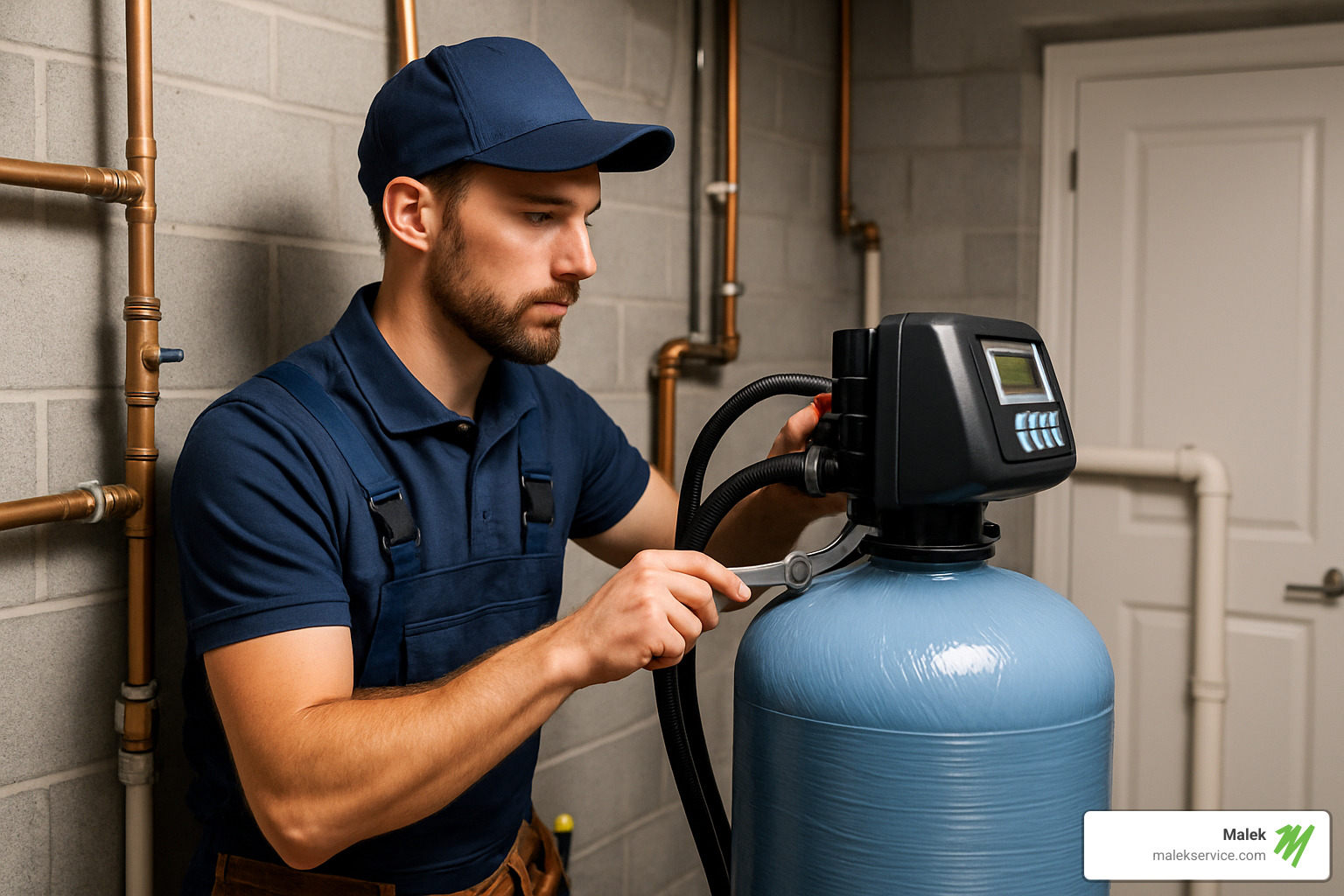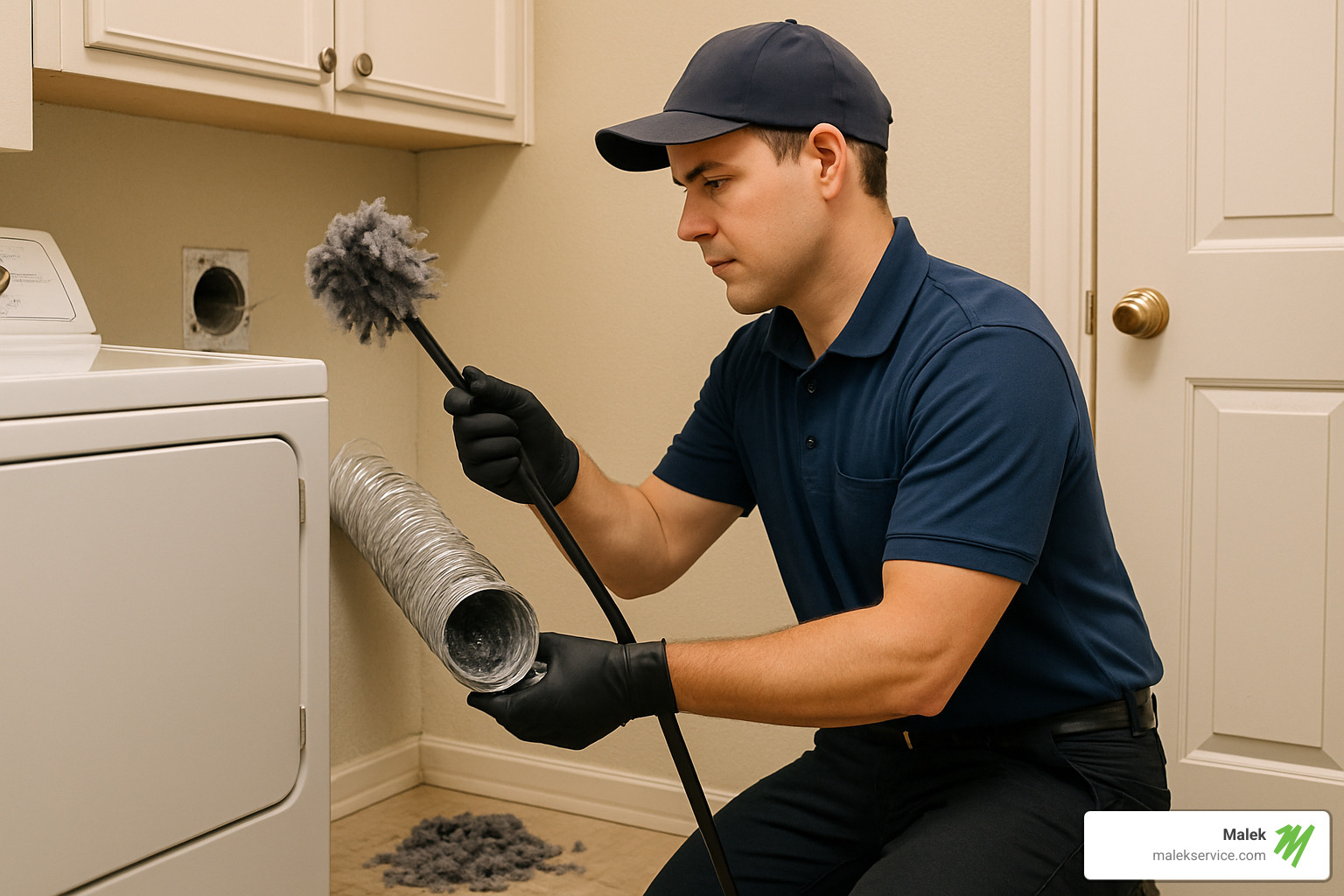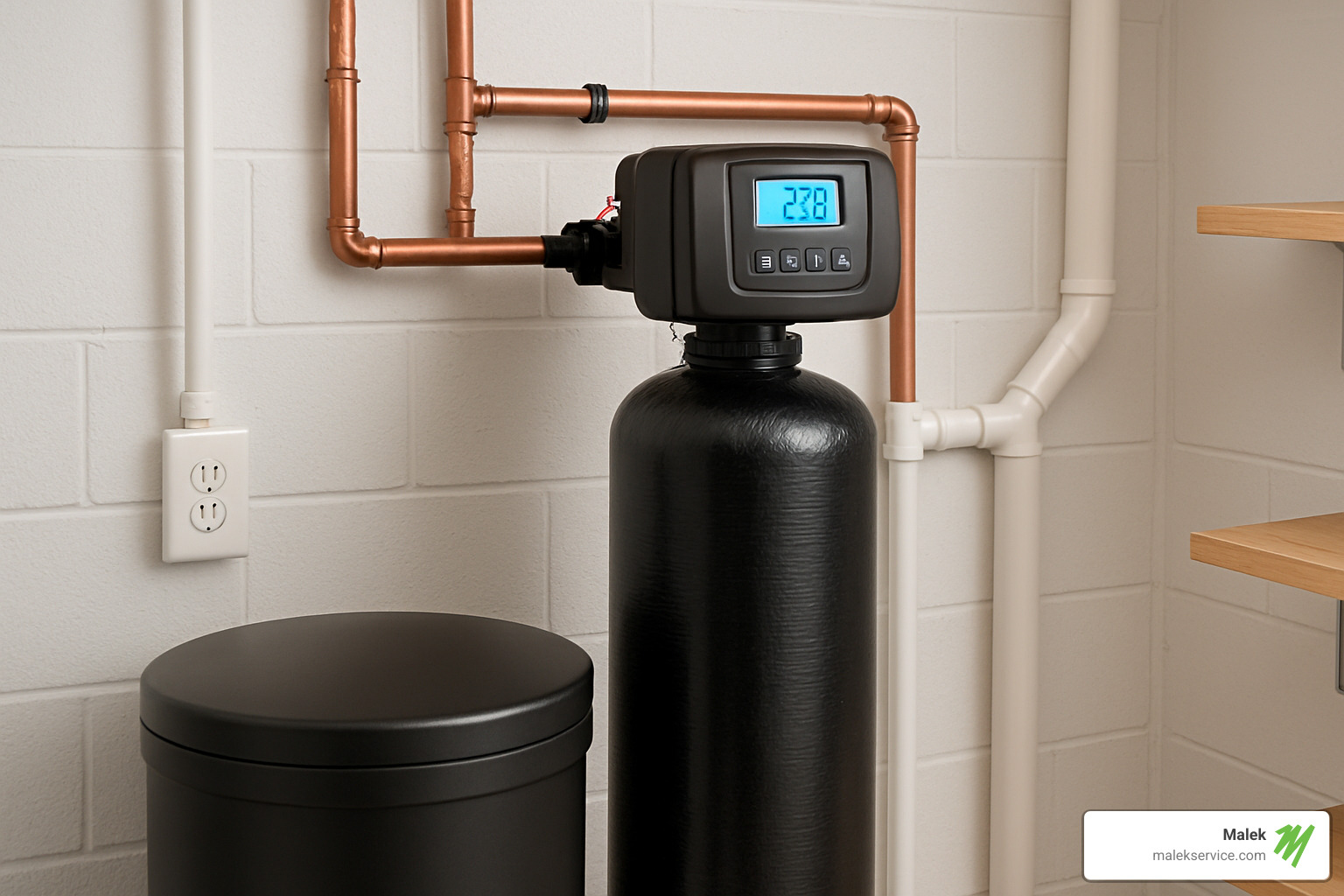The Hard Water Problem: Finding Solutions Close to Home
Looking for water softener installation near me? Here’s a quick guide to finding the right service:
- Check local directories – Many hardware stores and water treatment specialists offer professional installation services
- Average cost – $1,500 (typical range: $200-$6,000)
- Installation time – Usually takes 2-4 hours
- Professional vs. DIY – Professional installation recommended due to plumbing and electrical complexities
- Find reputable installers – Get multiple quotes, verify licenses, and check online reviews
If you’re noticing spots on dishes, scale buildup on faucets, dry skin, or dull laundry, you might be dealing with hard water. These frustrating symptoms affect millions of homes across America, and they’re more than just annoying—they’re costly. Hard water minerals damage your plumbing, reduce appliance lifespans, and force you to use more cleaning products.
Finding reliable water softener installation near me services is the first step toward solving these problems. Professional installation ensures your system is properly sized, correctly connected to your plumbing, and optimally programmed for your specific water hardness level.
While DIY installation might seem tempting, the combination of plumbing cuts, electrical connections, and system calibration make professional installation the smarter choice for most homeowners. As the Water Quality Association notes, proper installation is crucial for system performance and longevity.
I’m Courtney Zalesak, Vice President at Malek Service Company, and I’ve helped countless homeowners solve their hard water problems through expert water softener installation near me services that protect both plumbing systems and appliances. Our team of licensed professionals handles everything from initial water testing to system selection and installation, ensuring you get the perfect solution for your home’s specific needs.
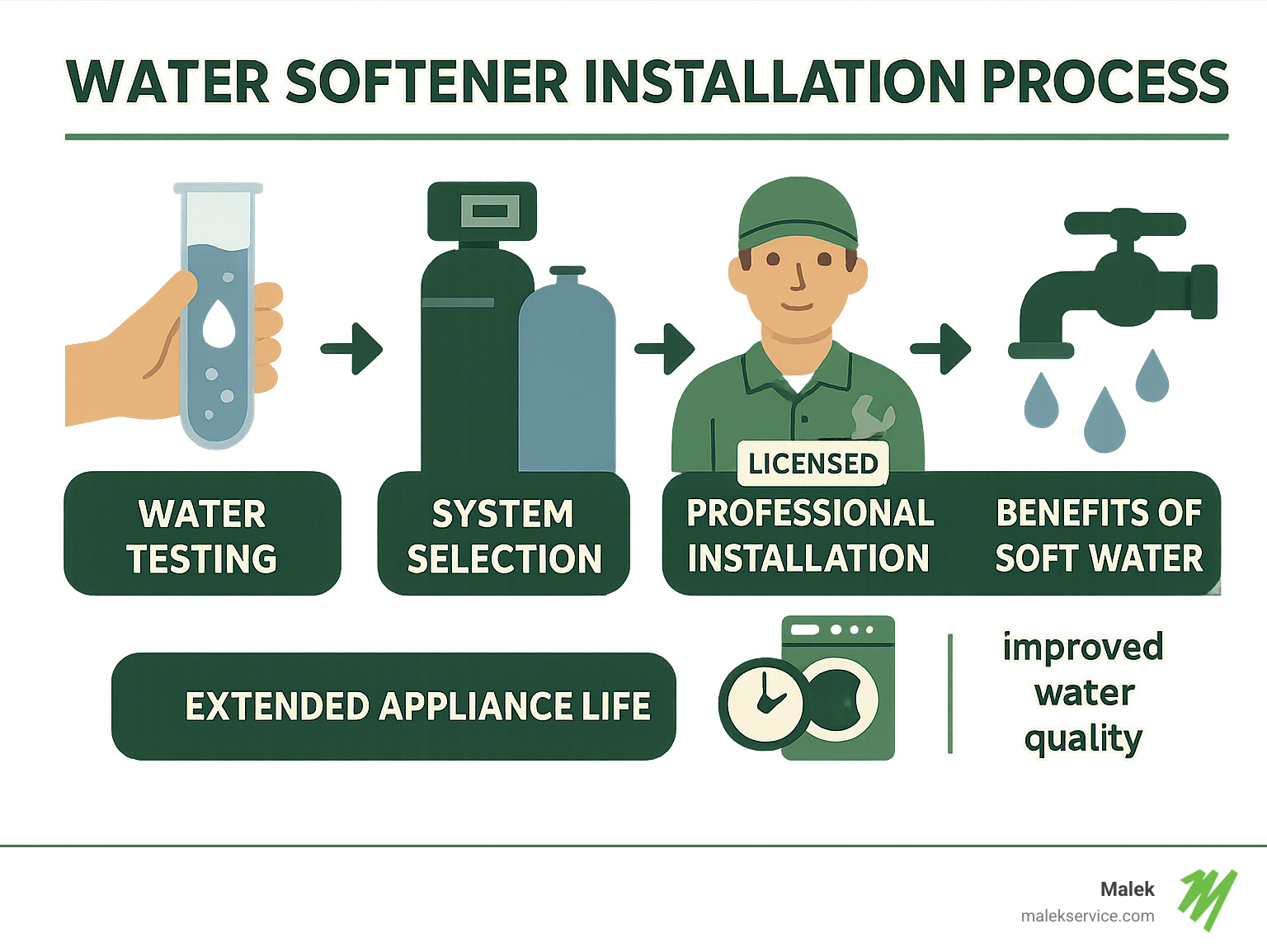
Hard Water & Softener Basics
Ever wonder why your dishes have spots, your skin feels dry after showering, or your favorite white shirt never looks quite clean? The culprit might be flowing right through your pipes: hard water.
Hard water isn’t actually “hard” to the touch – it’s regular water that contains high levels of dissolved minerals, primarily calcium and magnesium. Water professionals measure these minerals in grains per gallon (GPG), and anything above 7 GPG falls into the “hard” category. Many homes across America, especially in Texas and the Midwest, deal with water that’s well above this threshold.
When these mineral-rich waters flow through your home, they leave behind more than just memories. Scale buildup gradually forms on everything the water touches – from pipe interiors to appliance components. This isn’t just unsightly; it’s expensive.
“Most homeowners don’t realize they’re throwing money down the drain with hard water,” explains our senior technician. “Between shortened appliance lifespans, increased cleaning product usage, and higher energy bills from inefficient water heaters, hard water costs the average household hundreds annually.”
The effects go beyond your wallet. Skin and hair suffer too, as these minerals strip away natural oils, leaving you feeling dry and itchy after bathing. Soap doesn’t lather properly in hard water, requiring you to use more product with less effectiveness – that’s why your laundry might feel stiff and look dull despite using premium detergents.
While the EPA notes that drinking water hardness isn’t considered a health concern, the practical impacts on your home comfort and finances are significant enough that many homeowners seek solutions.
How Do I Know I Have Hard Water?
You don’t need special equipment to spot hard water – the signs are all around your home:
White spots or film appear on dishes, glassware, and shower doors no matter how well you clean them. These are mineral deposits left behind when water evaporates. Scale buildup on faucets and showerheads gradually reduces water flow and creates an unsightly crusty residue that’s difficult to remove.
After showering, does your skin feel tight and itchy? Do you find yourself using more lotion than ever before? Dry skin and dull hair are classic hard water symptoms, as minerals interfere with soap and strip away natural moisture.
Your appliances might be sending signals too. If your water heater makes popping sounds, that’s likely scale buildup insulating the heating element – forcing it to work harder and fail sooner. Most homeowners are shocked to learn that hard water can cut a water heater’s lifespan by 2-3 years!
Want confirmation? You have several options:
You can purchase a simple DIY test kit from any hardware store for under $10. Many local water treatment companies offer free water testing as a service (including us at Malek). Your municipal water quality report should list hardness levels for your area. Or check regional hardness maps – certain parts of the country (including much of Texas) are known for particularly hard water.
What Exactly Is a Water Softener and How Does It Work?
A water softener is your home’s defense against these troublesome minerals. At its core, a water softener is a filtration system that removes hardness-causing minerals through a fascinating process called ion exchange.
The heart of the system is the mineral tank, filled with thousands of tiny resin beads that do the actual softening work. These special beads carry a negative charge and are pre-loaded with sodium ions. When hard water flows through, the beads attract the calcium and magnesium ions (which have a stronger positive charge) like tiny magnets, releasing sodium ions in exchange – hence the name “ion exchange.”
“Think of those resin beads like bouncers at an exclusive club,” says our lead installation technician. “They let the sodium in but kick out the calcium and magnesium that cause problems in your home.”
Eventually, the resin beads become saturated with hardness minerals and need to be refreshed. That’s where the brine tank comes in – this separate container holds a salt solution that’s used during the regeneration cycle. During regeneration, the system flushes concentrated salt water through the resin beads, washing away the accumulated calcium and magnesium and recharging the beads with fresh sodium ions.
Modern water softeners handle this entire process automatically. The smartest systems use demand-initiated regeneration, which monitors your water usage patterns and only regenerates when necessary – saving salt, water, and energy.
Once your water softener installation near me service is complete, the only regular maintenance you’ll need to perform is adding salt to the brine tank every few weeks. It’s a small task that delivers big benefits: longer-lasting appliances, softer skin and hair, cleaner dishes, and brighter laundry – all while protecting your plumbing system from scale buildup for years to come.
Selecting & Sizing the Right System
Finding the perfect water softener for your home isn’t just about buying any system—it’s about finding the right match for your specific needs. Think of it like buying shoes: the wrong size will never feel quite right, no matter how good the quality.
Water softeners are rated by “grain capacity,” which tells you how many hardness minerals they can remove before needing to regenerate. For most homes, you’ll typically see these common sizes:
- 32,000-grain capacity: Perfect for smaller households (1-4 people) with average hardness
- 42,000-grain capacity: The sweet spot for medium-sized families (3-6 people) or homes with harder water
- 64,000-grain capacity: Ideal for larger families or when your water tests show extremely high hardness levels
“Many homeowners make the mistake of choosing a system that’s too small to save money upfront,” says our water softener installation near me expert. “But an undersized system works overtime, using more salt and water while potentially struggling to keep up with your family’s needs.”
Beyond just size, you’ll need to consider which type of system makes the most sense for your situation:
| Softener Type | How It Works | Best For | Maintenance | Cost Range |
|---|---|---|---|---|
| Salt-Based (Ion Exchange) | Exchanges minerals for sodium | Most homes with hard water | Regular salt refills | $800-$2,500 |
| Salt-Free (Conditioner) | Crystallizes minerals to prevent scaling | Homes where sodium is a concern | Minimal maintenance | $1,000-$3,000 |
| Dual-Tank | Uses two resin tanks for continuous soft water | High-usage households | Regular salt refills | $1,500-$4,000 |
| Magnetic/Electronic | Creates magnetic field to alter mineral behavior | Light hardness, small spaces | None | $200-$600 |
While salt-free systems might sound like the convenient choice, our experience shows that traditional salt-based systems typically deliver better results for most Texas homes, where water hardness tends to be moderate to high.
Calculating the Ideal Softener Size
Sizing your water softener correctly is a bit like Goldilocks—you want it just right. To find your perfect match, you’ll need to know three key things:
- Your daily water usage
- Your water hardness level (from testing)
- Iron content (if your water has iron issues)
Here’s a simple formula that takes the guesswork out of sizing:
Required Grain Capacity = (Household Members × 75 gallons/day × Hardness Level × Days Between Regenerations)
Let’s say you have a family of four, water hardness of 10 grains per gallon, and you want the system to regenerate weekly:
4 people × 75 gallons/day/person × 10 grains/gallon × 7 days = 21,000 grains
In this case, a 32,000-grain system would give you comfortable capacity with some buffer for guests or higher-than-average usage days.
Don’t forget to factor in your future plans too! If you’re expecting family growth, have frequent guests, or run water-hungry appliances, you might want to size up. And if your water test shows iron (each 1 ppm equals about 3 additional grains of hardness), be sure to account for that in your calculations.
Feature Checklist Before You Buy
Before you commit to a particular water softener installation near me option, make sure your chosen system includes these important features:
NSF Certification ensures your system meets industry standards for safety and performance—never skip this! A quality control valve with demand-initiated regeneration will optimize salt and water usage, saving you money over time.
Look for a bypass valve that lets you route water around the softener when needed (like when watering your garden). If your water test showed iron issues, choose a system specifically rated for iron removal.
Modern convenience features like Wi-Fi monitoring let you check salt levels and system performance right from your smartphone—perfect if you travel frequently or have a vacation home. “Our customers who choose smart-enabled systems tell us they love the peace of mind,” shares our installation coordinator at Malek Service.
Don’t overlook the warranty coverage—look for at least 3-5 years on the tank and 1-2 years on parts. Features like overflow protection prevent flooding if something goes wrong with the brine tank. And finally, consider resin quality—premium resin can last 10-15 years versus just 5-10 for standard resin.
Taking time to select the right system now means fewer headaches and better performance for years to come. At Malek, we’re happy to help you steer these choices to find the perfect match for your home’s specific needs.
Water Softener Installation Near Me: Planning, Process & Providers
Searching for water softener installation near me can feel overwhelming, but with a little planning, you’ll be enjoying soft water before you know it. Let me walk you through what to expect when you’re getting a water softener installed in your home.
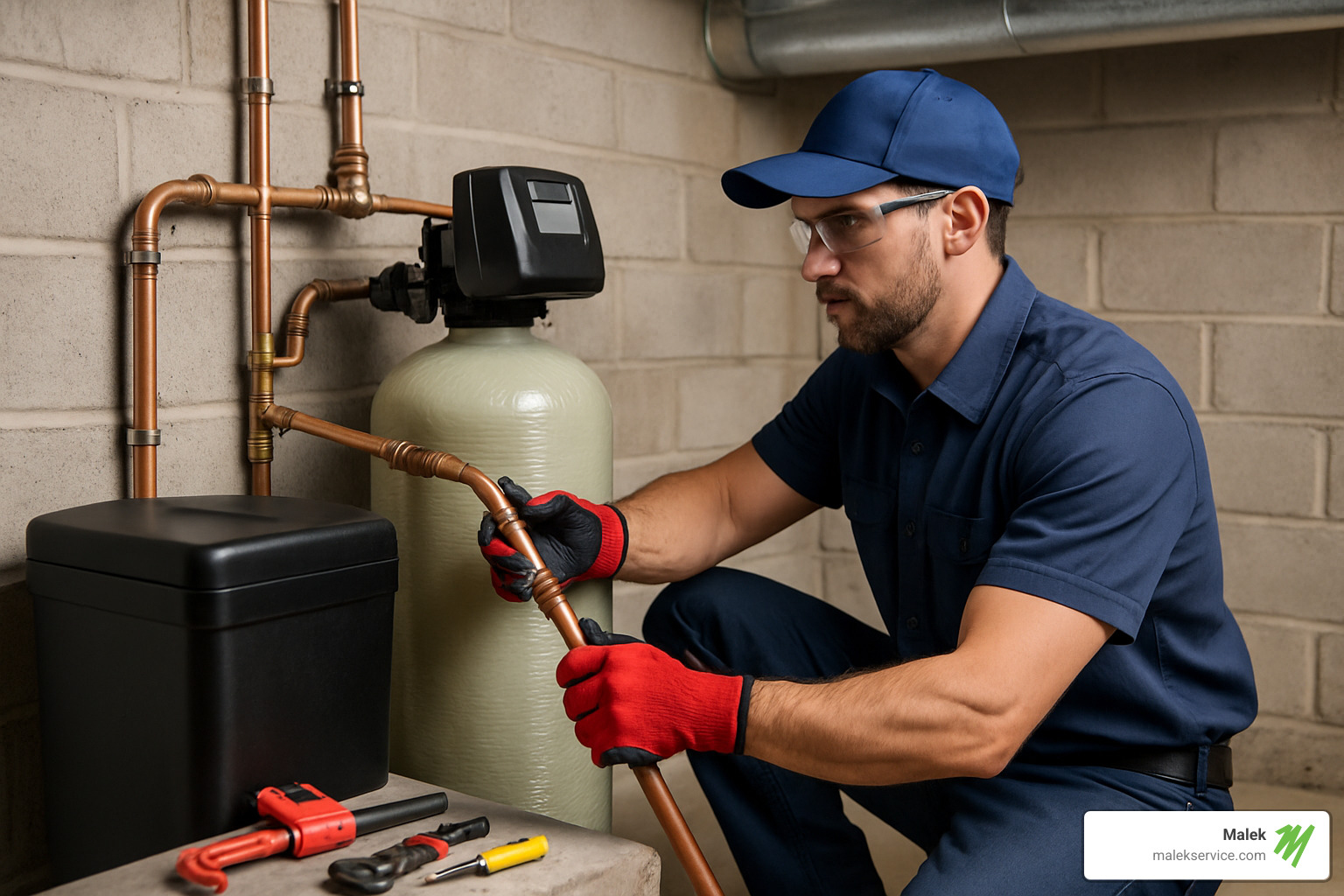
Think of water softener installation as a mini home improvement project. Your installer will need to connect the system to your main water line (before it branches to your water heater), set up proper drainage for when the system regenerates, and connect it to a power source. While it might sound straightforward, proper installation requires familiarity with local plumbing codes and technical know-how.
“Finding the perfect spot for your water softener is like finding the perfect spot for a new piece of furniture—except this furniture needs water, electricity, and drainage,” explains our lead plumbing technician. “We typically look for locations in garages, utility rooms, or basements where all three are easily accessible.”
When you schedule your water softener installation near me service, here’s what typically happens:
First, your technician will assess your home, confirming water hardness levels and identifying the ideal installation location. They’ll handle any required permits (these vary by city and county), then temporarily shut off your water supply while they work their magic. The actual installation involves connecting the system to your plumbing, setting up the drain line for when the system flushes out hardness minerals, and connecting to a nearby GFI-protected electrical outlet.
Once everything’s connected, your installer will program the system based on your specific water hardness and household size, test everything thoroughly, and walk you through how to care for your new system. Most installations take between 2-4 hours, depending on your home’s configuration.
At Malek Service, our technicians are familiar with the unique plumbing characteristics found throughout our Texas service areas, including College Station, Houston, Brazos County, and surrounding communities. We’ll make sure your system is properly installed and ready to deliver years of soft water benefits.
Want to learn more about our professional plumbing installation services? Visit our Plumbing Installation page for details.
How to Prepare for Water Softener Installation Near Me
A little preparation goes a long way toward ensuring your water softener installation near me service goes smoothly. Before your technician arrives, take some time to get your home ready.
First, clear out a space about 3×3 feet where your system will live. This gives the technician plenty of room to work and ensures your system has the breathing room it needs. Make sure the path to your main water line is clear and accessible—this might mean moving storage boxes in the garage or clearing out that cluttered utility closet.
“I always appreciate when homeowners have already cleared the space before I arrive,” shares one of our installation specialists. “It means I can get right to work, and they’ll have their soft water that much sooner!”
Consider protecting your flooring if the installation area has nice floors—a few old towels or a drop cloth will do the trick. And since your water will be shut off during installation (typically for 2-4 hours), plan accordingly. Maybe fill a pitcher for drinking water or schedule the installation when you won’t need to shower or do laundry.
It’s also helpful to jot down any questions you have about operating or maintaining your new system. Our technicians are happy to show you how to check salt levels, program the control panel, and handle basic maintenance, but it’s easier to remember everything if you’ve prepared your questions in advance.
DIY vs Professional—Which Route Fits You?
When you’re searching for water softener installation near me, you might wonder if you could save money by installing it yourself. Let’s weigh the pros and cons to help you decide which approach makes sense for your situation.
DIY installation might seem appealing if you’re handy and want to save on labor costs. There’s certainly satisfaction in completing a home project yourself, and you can work on your own schedule. However, there are significant drawbacks to consider. Improper installation can void your warranty, lead to water damage, and result in a system that doesn’t effectively soften your water. Plus, you’ll need to steer permit requirements and plumbing codes on your own.
“I’ve seen plenty of well-intentioned DIY installations that ended up costing more in the long run,” our senior plumbing technician shares with a knowing smile. “One homeowner created an elaborate bypass system that accidentally sent all their water around the softener instead of through it. They went three months wondering why they still had hard water!”
Professional installation, on the other hand, offers peace of mind. A qualified installer will ensure your system is properly sized, correctly connected, and programmed for optimal performance. They’ll handle all the permitting, make sure everything is up to code, and typically provide a workmanship warranty. The downside? It costs more upfront and requires scheduling around the installer’s availability.
Before deciding to DIY, honestly assess your plumbing experience. Are you comfortable cutting and connecting copper or PEX pipes? Do you know how to properly solder connections? Do you understand how to program a water softener based on your specific water hardness? If you answered “no” to any of these questions, professional installation is probably your best bet.
Finding Reputable Installers Close to Home
Finding a trustworthy professional for your water softener installation near me search doesn’t have to be stressful. With a bit of research, you can identify qualified installers who’ll do the job right the first time.
Start by checking online reviews on Google, Yelp, and the Better Business Bureau. Look for companies with consistently positive feedback, especially regarding their installation services. Pay attention to how they respond to any negative reviews—a company that addresses concerns professionally is often one that takes customer service seriously.
Proper licensing is non-negotiable. Ensure any installer you’re considering holds the appropriate plumbing licenses for your state and local municipality. Don’t be shy about asking for license numbers and verifying them with your local licensing board.
“A quality installer will ask about your water usage patterns and test your water hardness before recommending a system,” explains our installation coordinator. “If someone tries to sell you the most expensive system without assessing your needs first, that’s a red flag.”
Getting multiple quotes helps ensure you’re receiving fair pricing, but don’t automatically go with the lowest bid. Consider the installer’s experience, reputation, and what’s included in their service. A slightly higher price often reflects better quality work and materials.
At Malek Service, we pride ourselves on our thorough approach to water softener installation. All our technicians are background-checked, licensed, and continuously trained on the latest water treatment technologies. We serve communities throughout Texas, including Houston, College Station, Brazos County, Grimes County, and surrounding areas.
For more insights on combating hard water problems, check out our guide on Stop Hard Water Limescale from Ruining Your Home.
Costs, Financing & Ongoing Care
Let’s talk about what it really costs to solve your hard water problems. When you’re searching for water softener installation near me, understanding the complete financial picture helps you make the right choice for your home and budget.
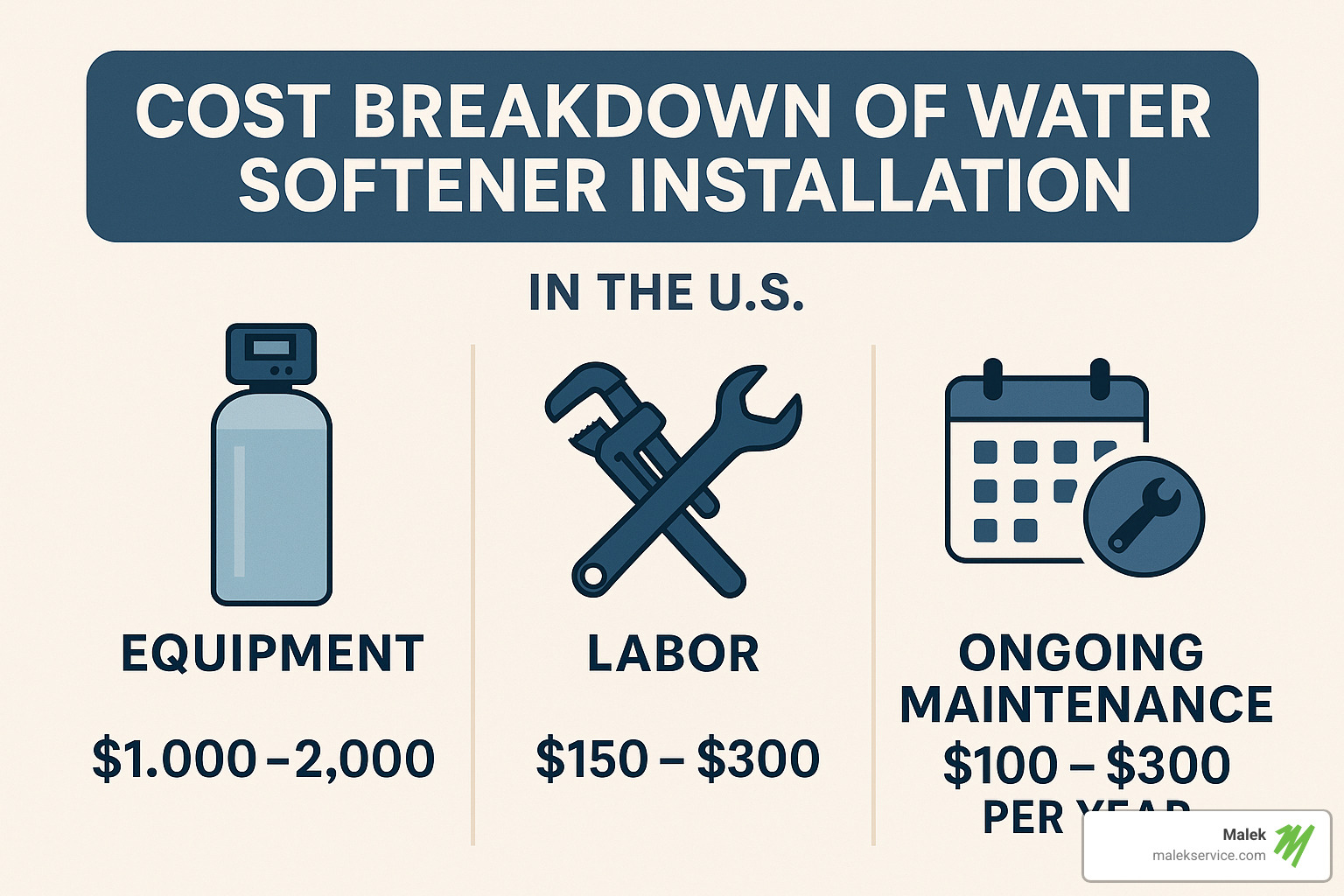
The average homeowner spends about $1,500 for a complete water softener installation, though this can range anywhere from $200 to $6,000. Why such a wide range? Several factors come into play:
Your system type and capacity makes the biggest difference – basic models start around $400, while feature-rich systems with all the bells and whistles might run $2,500 or more. The installation complexity adds another $150 to $1,000 for labor, with older homes often landing on the higher end of that range due to their unique plumbing configurations.
Don’t forget about permit requirements, which can add $50-$200 depending on your local regulations. Some municipalities are stricter than others – we’ve seen quite a variety across Texas! Professional water testing might add another $100-$200 if it’s not already included in your installation package.
Here’s what a typical installation might cost:
| Cost Component | Typical Range | Average Cost |
|---|---|---|
| Water Softener Unit | $400-$2,500 | $900 |
| Installation Labor | $150-$1,000 | $500 |
| Permits (if required) | $50-$200 | $100 |
| Additional Materials | $50-$200 | $100 |
| Total | $650-$3,900 | $1,600 |
“I totally understand the sticker shock some homeowners feel,” says our sales manager with a smile. “But I always remind them to consider what they’re saving long-term. Your water heater and appliances will last 30-50% longer, you’ll spend about 70% less on cleaning supplies, and you’ll avoid those expensive emergency plumbing calls when scale builds up in your pipes.”
Want a more personalized estimate based on your specific home and location? The Homewyse Calculator: Cost to Install Water Softener is a helpful tool to get you started.
A quality water softener typically serves your home faithfully for 10-20 years with proper care – that’s a lot of soft-water showers, spot-free dishes, and longer-lasting appliances!
Financing Options to Keep It Affordable
Don’t let the upfront cost stop you from enjoying soft water. There are plenty of ways to make the investment more manageable:
Manufacturer financing often provides competitive rates specifically for their systems. Many of our customers appreciate our installer payment plans at Malek Service, which can help spread the cost over time without straining your monthly budget.
Home improvement loans are another popular option, as they’re designed specifically for upgrades like this and usually offer favorable terms. If you have good credit, credit card promotions with 0% APR for 12-18 months can be smart choices too.
Don’t overlook utility company programs – some local water providers offer rebates or special financing for water-efficient equipment, which can significantly reduce your costs.
“We see many families using our financing options with terms of 36, 60, or even 84 months,” our financial services coordinator explains. “What’s interesting is that their monthly payment is often less than what they were spending on extra cleaning supplies, bottled water, and frequent appliance repairs before getting their water softener.”
When exploring financing, be sure to compare interest rates, check for any prepayment penalties, understand all associated fees, and calculate your total cost over the life of the loan. Many of our customers qualify for same-day approval, which means you could be enjoying soft water by bedtime!
Maintenance Must-Dos After Installation
Your new water softener needs a little TLC to keep it running smoothly for years to come. Here’s how to keep it happy:
Monthly salt checks are the most important maintenance task – peek into your brine tank once a month and add salt as needed. Most families go through 1-3 bags monthly, depending on water usage and hardness levels.
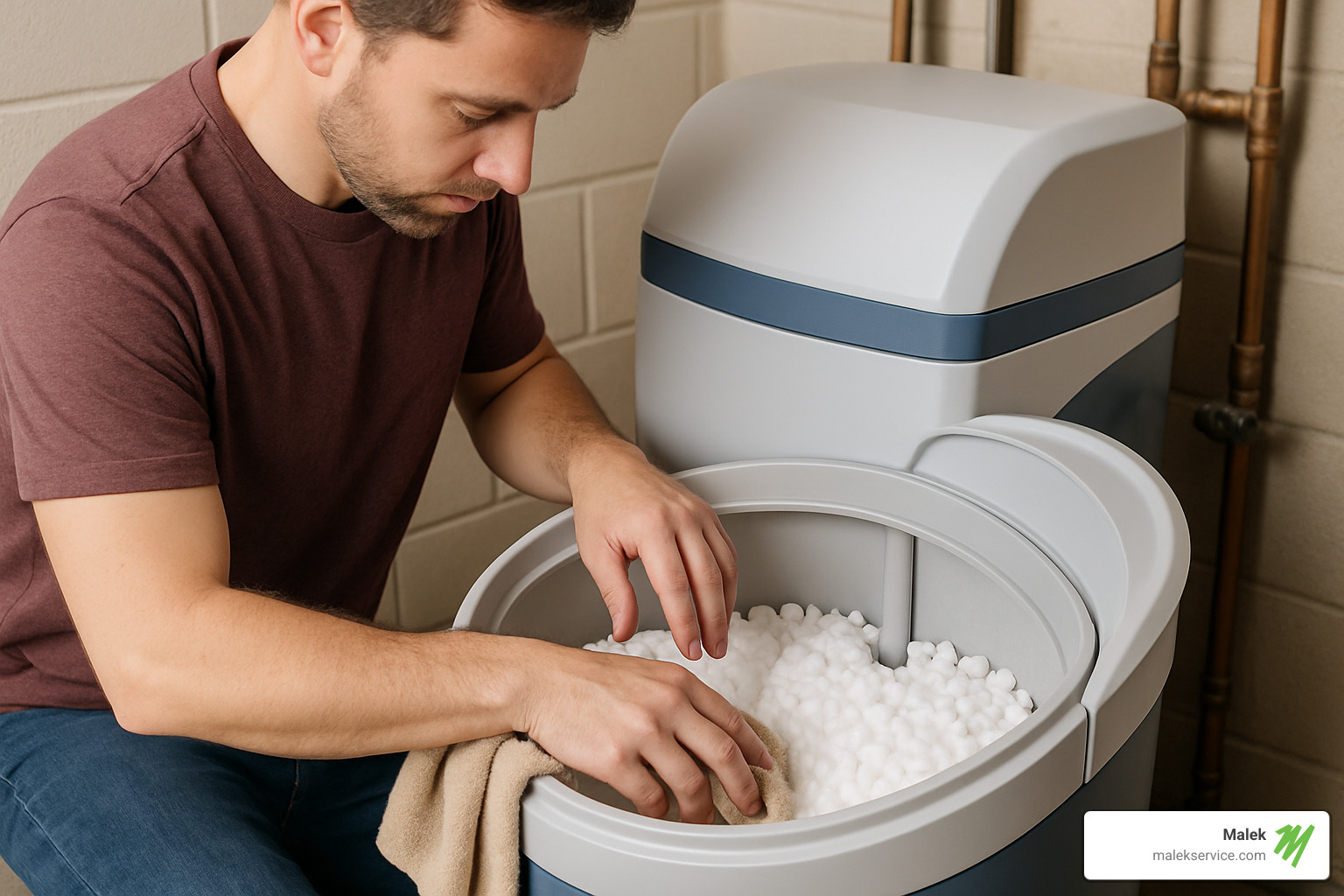
Every 6-12 months, take a few minutes to clean the brine tank to remove any salt bridges or sludge that might have formed. This simple step prevents many common performance issues. Once a year, use a resin cleaner to freshen up the resin bed and remove iron and other contaminants that reduce efficiency over time.
Don’t forget to occasionally check and clean the venturi valve – this small but crucial component can become clogged with sediment, affecting the regeneration process. When you’re watering the lawn or doing other activities that don’t require soft water, use the bypass valve to conserve salt and extend your system’s life.
“The most common service call we get is from homeowners who simply forgot to add salt,” our service department manager chuckles. “I always suggest setting a monthly reminder on your phone – such a simple thing can save you from suddenly having hard water again!”
For busy homeowners, scheduling an annual professional maintenance visit gives you peace of mind that your system is running at peak efficiency. Our technicians check all components, clean what needs cleaning, and make any necessary adjustments to keep your water perfectly soft.
For more detailed information on maintaining all your plumbing systems, including water softeners, visit our Plumbing Maintenance page.
Frequently Asked Questions about Water Softener Installation Near Me
How soon will I notice softer water?
When you’ve just had a water softener installed, you’re probably eager to experience the benefits you’ve invested in. The good news? You won’t have to wait long!
You’ll notice the effects in your cold water almost immediately after your system goes online. That first hand-washing will feel noticeably different—your soap will lather more easily, and the water will have that characteristic “slippery” feel that soft water provides.
“Most of our customers call us within hours of installation to tell us they can already feel the difference,” shares our technical specialist. “It’s that dramatic of a change, especially if you’ve been living with very hard water for years.”
Your hot water, however, requires a bit more patience. Since your water heater contains a reservoir of pre-softened water, it needs time to cycle through. Depending on your water heater’s size and how much hot water your household uses, you’ll typically experience completely soft hot water within 24-48 hours as your water heater gradually refills with the newly softened water.
Within the first week, you’ll begin noticing fewer spots on dishes, more suds from less soap, and gradually improving shower experiences. The longer-term benefits—like softer laundry, healthier skin and hair, and the disappearance of existing scale deposits—will become increasingly apparent over the first few weeks of use.
What warranties or guarantees are typical?
When researching water softener installation near me, understanding warranty protection should be a priority. A quality water softener represents a significant investment in your home, and proper warranty coverage ensures that investment is protected.
Most reputable water softener systems come with multi-component warranties that vary by part:
For the physical components, manufacturers typically offer 10-year to lifetime coverage on mineral and brine tanks, as these should last decades without issues. The electronic control valve—the system’s brain—usually carries a 3-7 year warranty, reflecting its more complex nature and moving parts.
The installation itself is typically covered separately. At Malek Service, we stand behind our work with a comprehensive one-year labor warranty on all installations, complementing the manufacturer’s equipment coverage. This dual protection ensures you’re covered against both equipment failures and any installation-related issues.
“Never proceed with installation without getting warranty details in writing,” advises our customer service manager. “Some warranties require annual professional maintenance to remain valid, while others might be voided by DIY installation. Understanding these nuances upfront prevents surprises down the road.”
Be sure to store your warranty documentation somewhere safe and accessible. Many of our customers create a dedicated folder for their water softener paperwork, including warranty information, maintenance records, and our contact information for service needs.
Are there regional code differences I should know?
Yes, and they matter more than most homeowners realize! When searching for water softener installation near me, working with professionals who understand your specific local regulations can save you significant headaches.
Plumbing codes and permit requirements for water softener installation vary surprisingly widely from one location to another. What’s perfectly acceptable in one city might actually violate codes just a few miles away.
Some of the most common regional variations include drain connection requirements, with some jurisdictions mandating specific air gap measurements to prevent potential contamination. Brine discharge regulations also differ significantly—especially important if you have a septic system, as some areas have strict rules about discharging softener regeneration waste.
Permit requirements are another variable. While some municipalities require permits for any modification to your plumbing system, others consider water softener installation minor enough to proceed without formal approval.
“Here in Texas, we steer a patchwork of requirements,” explains our compliance manager. “What’s required in parts of Houston differs from College Station or Brazos County. Our technicians carry reference materials for each jurisdiction we serve to ensure every installation meets local standards.”
This regional knowledge is one of the strongest arguments for choosing a local, experienced installer like Malek Service. We’ve done the homework on compliance requirements throughout our service area, ensuring your installation won’t just work well—it’ll be fully code-compliant, protecting you from potential fines or complications when selling your home.
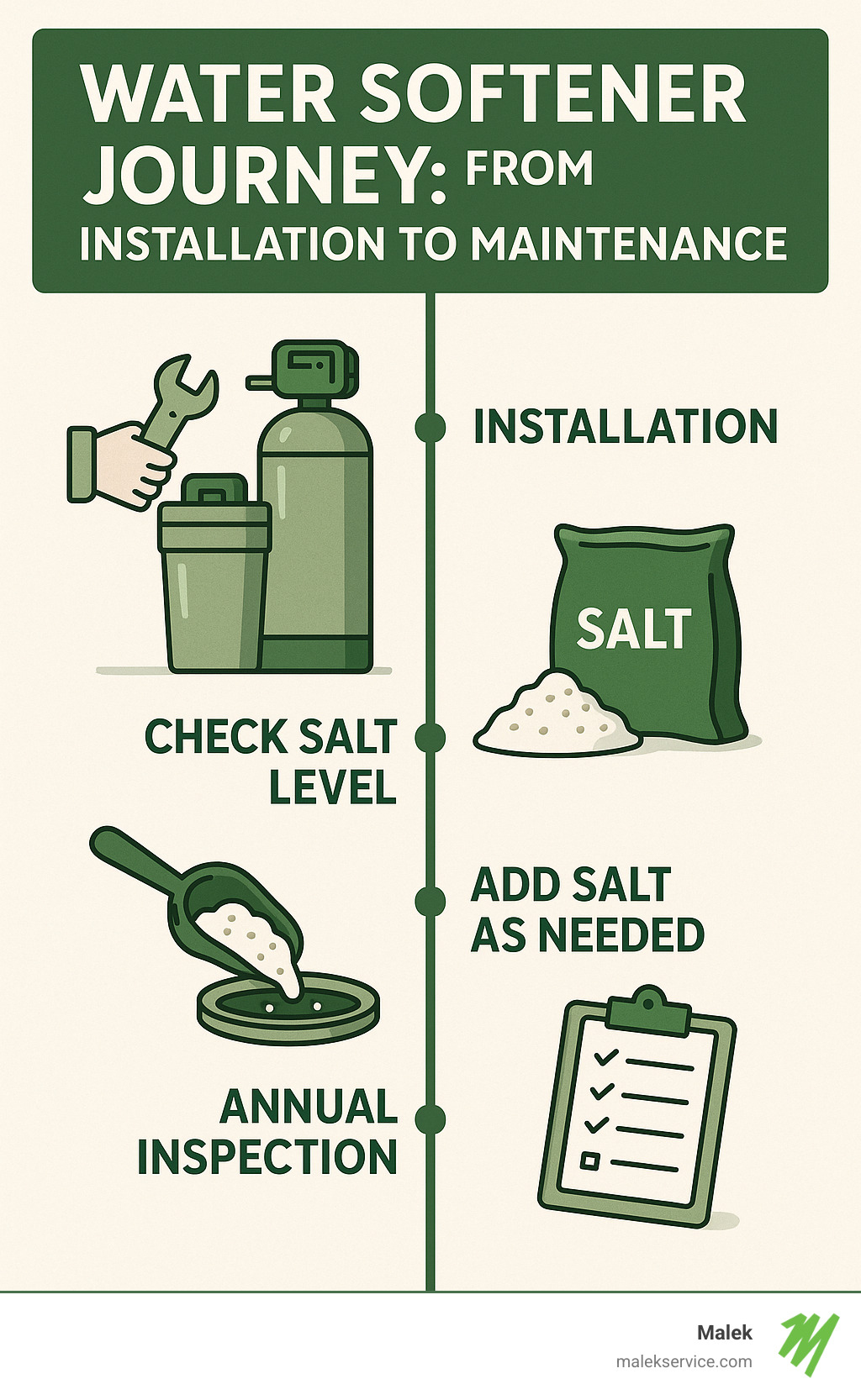
Conclusion
Finding reliable water softener installation near me services is the crucial first step toward solving hard water problems that affect your home, appliances, and daily life. Throughout this guide, we’ve covered the essentials of understanding hard water, selecting the right system, planning for installation, and maintaining your investment.
Remember these key takeaways:
- Hard water isn’t just annoying, it’s costing you money through damaged appliances, excessive cleaning product use, and potentially shortened plumbing lifespan.
- Proper sizing and selection of your water softener system is crucial for effective performance and efficiency.
- While DIY installation is possible, professional installation ensures proper setup, programming, and compliance with local codes.
- Ongoing maintenance is simple but essential regular salt checks and annual cleaning will keep your system running efficiently for 100 years.
At Malek Service, we understand that every home’s water needs are unique. Our experienced, licensed technicians serve communities throughout Texas, including College Station, Houston, Brazos County, and surrounding areas, providing expert water softener installation custom to your specific water conditions and household needs.
Our installation process includes comprehensive water testing, system sizing consultation, professional installation by licensed technicians, and thorough education on system operation and maintenance. We stand behind our work with solid warranties and ongoing support.
Ready to solve your hard water problems once and for all? Contact Malek Service today for a free water hardness assessment and installation consultation. Our team is ready to help you enjoy the many benefits of properly softened water throughout your home.
For more information about our comprehensive plumbing services, visit our plumbing services page.
